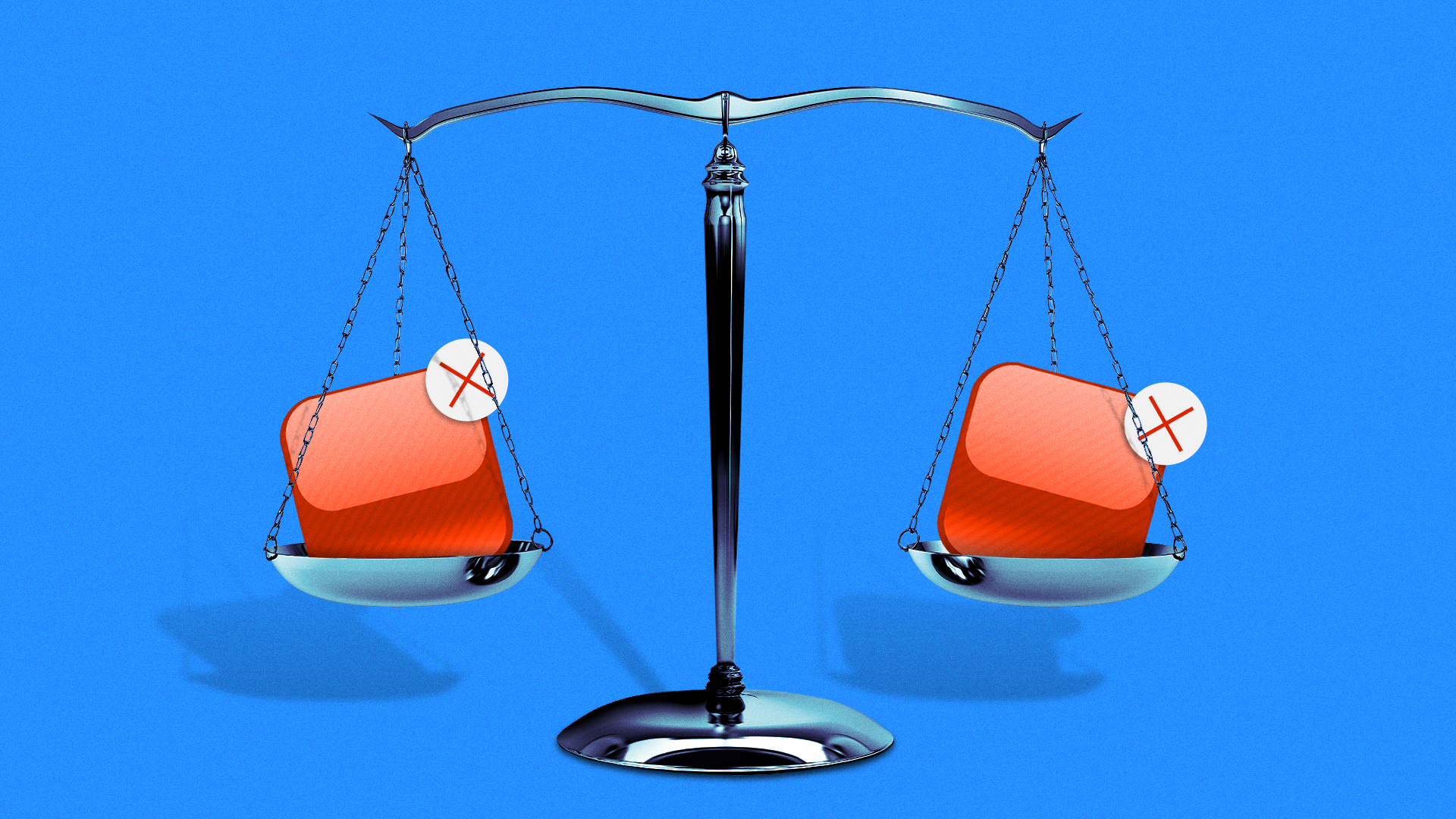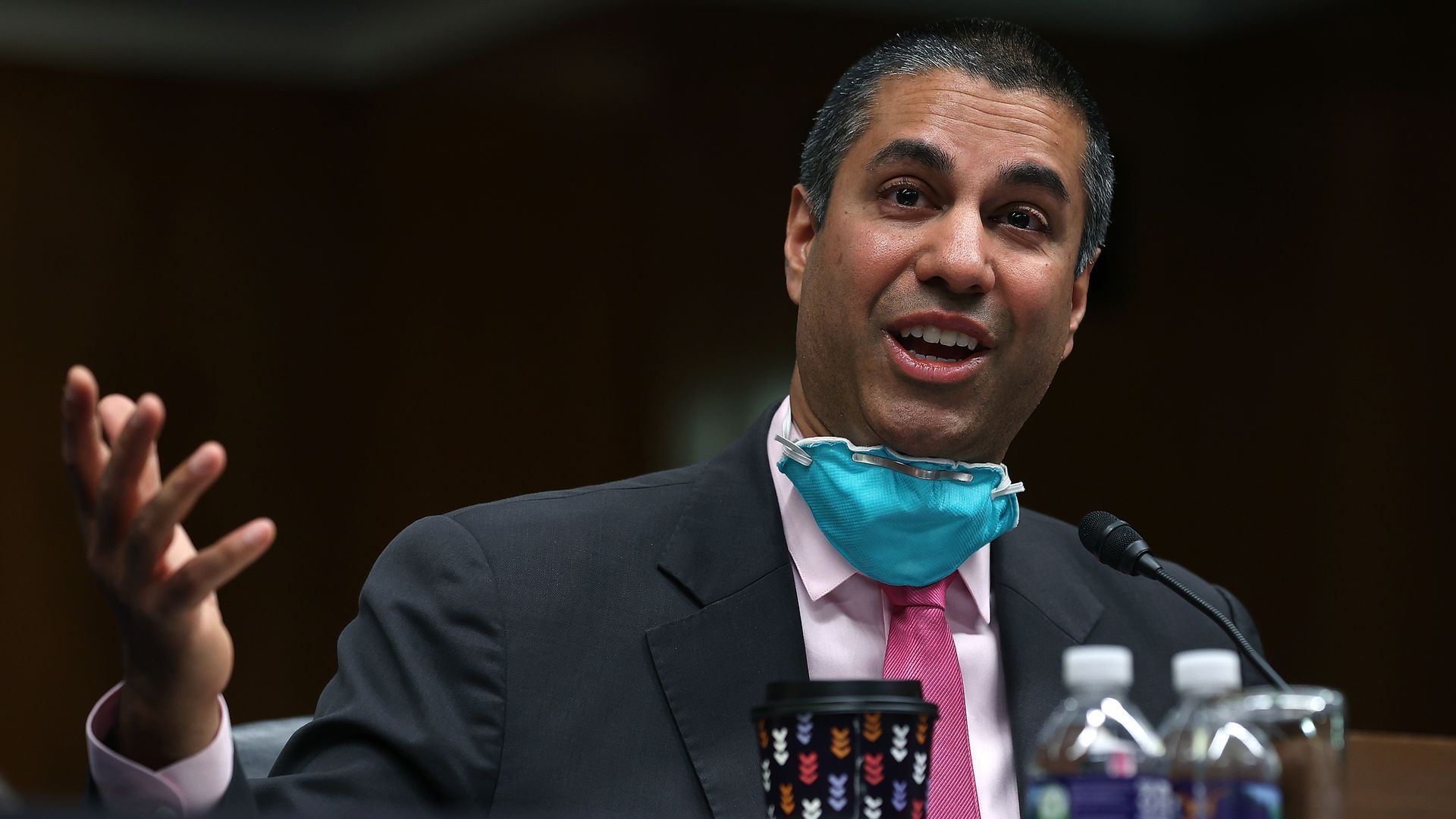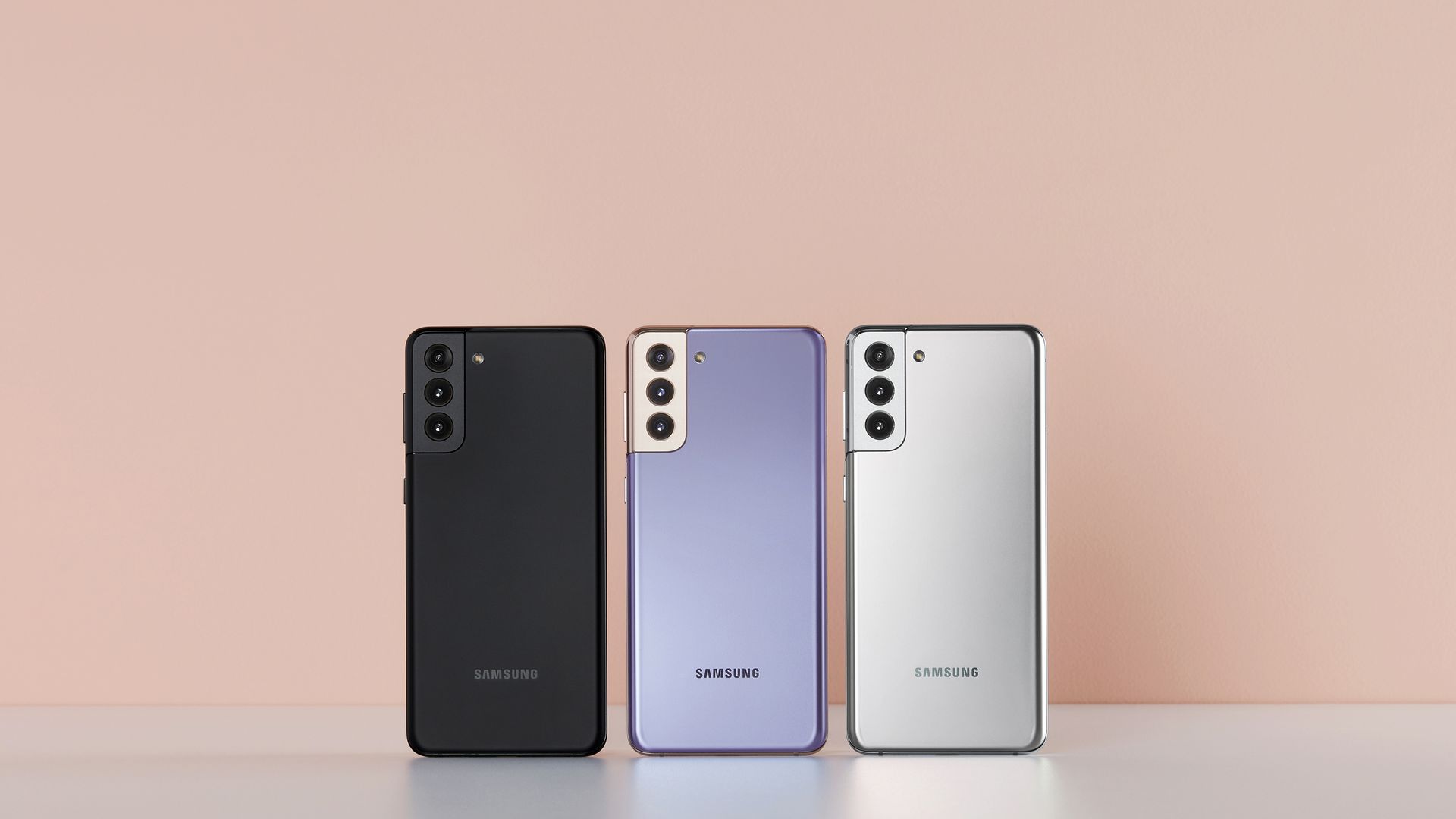| | | | | | | Presented By JobsOhio | | | | Login | | By Ina Fried ·Jan 15, 2021 | | Join Axios' Caitlin Owens today at 12:30pm ET for a virtual event on health care access and affordability in the Biden administration, featuring former FDA commissioner and CMS administrator Mark McClellan and former Rep. Greg Walden (R-Ore.) Today's Login is 1,397 words, a 5-minute read. | | | | | | 1 big thing: The deplatforming fight shifts to the courts |  | | | Illustration: Eniola Odetunde/Axios | | | | The Capitol riot and tech firms' sweeping attempt in its wake to dislodge the online far right are kicking up efforts to have the courts settle knotty questions about online speech and power, Axios' Margaret Harding McGill and Ashley Gold report. Why it matters: Legal battles could force the people angry at Big Tech to bring more rigor to arguments that have often devolved into messy sideshows. What's happening: Conservatives have insisted for years that Silicon Valley is biased against them, but the Capitol siege and subsequent deplatforming are drawing sharper battle lines between the mainstream and the online right. Parties on either side are this week pleading with judges and prosecutors to intervene. Parler vs. Amazon: Parler sued Amazon after its AWS unit kicked the right-wing-friendly social network off its hosting due to violent threats made on the platform before the Capitol siege. Parler contends Amazon breached its contract and is breaking antitrust laws, hurting Parler to benefit Twitter, another AWS client. - In a hearing Thursday, Parler's attorney said "millions of law-abiding Americans have had their voices silenced by AWS's decision," which he contended was made without sufficient notice.
- Amazon argued it had the right to terminate service immediately and said Parler has shown itself unwilling and unable to develop a moderation plan for keeping harmful content off the platform.
Rumble vs. Google: Toronto-based Rumble, an increasingly popular streaming-video platform on the right, sued Google, accusing it of steering users of its search engine to YouTube over competing video services. - "We will defend ourselves against these baseless claims," a Google spokesperson said.
ADL v. Gab: No civil suits have been filed or threatened, but the ADL is calling on right-wing-friendly social network Gab to potentially be held criminally liable for Capitol riot mobilization on its platform. Section 230, which shields online platforms from civil liability over user-posted content, doesn't apply to federal crimes. - The group, per a Wednesday letter, wants the Justice Department and FBI to open a criminal investigation into whether Gab "intentionally aided, conspired with, or directed individuals to carry out the January 6 attack."
- "The ADL should be calling for an investigation into Facebook, where the protests were actually organized," Gab CEO Andrew Torba countered in a blog post.
Between the lines: The Parler and Rumble suits, as well as the prospect of Gab being prosecuted, are all viewed as long shots. - The Rumble lawsuit most closely resembles other serious litigation targeting tech giants, with allegations of self-preferencing in search at the heart of an antitrust suit that dozens of state attorneys general filed against Google last month.
- But Rumble still faces an uphill battle. The company would have to convince a judge to accept a novel interpretation of existing antitrust laws to account for new technology — a tough sell.
Our thought bubble: The calls for intervention from judges and prosecutors, more than serious legal arguments, are an attempt to formalize an expression of rage on either side. - Still, that anger isn't going away, and neither are major tech firms' efforts to tamp down on violent and threatening rhetoric. Expect to see more lawsuits and calls for prosecution yet.
|     | | | | | | 2. Wikipedia turns 20 |  Data: Wikimedia; Chart: Michelle McGhee/Axios What began as a free alternative to World Book and Encyclopedia Britannica has become one of the biggest repositories of basic information and a testament to the power of the open web. Why it matters: As Wikipedia turns 20 today, it's worth taking a look at the rise of the massive site and the impact it has had. Flashback: Wikipedia debuted on Jan. 15, 2001, as the brainchild of Jimmy Wales and Larry Sanger, who gave the site its name, a portmanteau of wiki — derived from the Hawaiian for "quick" and then already in use to refer to a family of user-editable websites — and encyclopedia. By the numbers: - Wikipedia boasts 55 million articles across 300 languages. Roughly 89% of the articles are in languages other than English.
- More than 280,000 volunteers help add to the site and keep it updated. Wikipedia is edited 350 times per minute.
- Wikipedia is accessed by 1.5 billion unique devices every month and read more than 15 billion times every month.
- Wikipedia is supported by nearly 7 million donors, each donating about $15 on average.
Between the lines: In a world where basic facts are often the subject of partisan disagreement, Wikipedia has emerged as the rare site that is widely trusted across ideological lines and is also a go-to for populating information panels on Google and other major search and portal sites. Yes, but: Wikipedia has plenty of notable weak spots, including the lack of diversity among those who edit pages. - That translates to a fair amount of blind spots, especially for people of color, trans people and those from other underrepresented groups. (Trust me, I know)
- And, while generally a reliable source of information on many topics, it can be unreliable at any given moment on any topic. Its strongest virtue — that anyone can edit it — can also be its biggest weakness.
|     | | | | | | 3. Pai says tech giants need to explain themselves |  | | | FCC chairman Ajit Pai testifies at a Senate hearing June 16, 2020. Photo: Chip Somodevilla/Getty Images | | | | Federal Communications Commission chairman Ajit Pai says online platforms should be forced to explain their practices in the much the same way he required of broadband providers like Comcast and AT&T, Margaret reports. The big picture: Pai paired those transparency requirements with his 2017 repeal of net neutrality rules. Open-internet proponents feared the repeal would lead to ISPs blocking websites or deliberately slowing traffic, but bipartisan concern has largely shifted to the power of platforms like Google and Facebook to shape what people see online. What they're saying: In an interview with Axios, Pai took a dig at online companies that supported net neutrality rules for broadband providers who appear to be "unwilling to abide by" similar rules themselves. - "The FCC instituted a strict transparency requirement applicable to internet service providers," Pai told Axios. "They have to disclose, either on their own website, or to the FCC, information about their business practices. What is the argument against requiring tech giants who operate in a similar adjacent space to abide by the same restrictions?"
What's next: Pai steps down from the FCC on Jan. 20 and told Axios he hasn't made any plans on what he'll do next. |     | | | | | | A message from JobsOhio | | Be where tech is going, not where it's been | | |  | | | | Welcome to the new startup hotspot: Ohio. Ohio has top U.S. cities for startups, a skilled and growing tech workforce, and modern infrastructure at a fraction of the cost of Silicon Valley. See what makes Ohio better for leaders in technology. | | | | | | 4. Samsung focuses on lower prices, improved cameras |  | | | Courtesy: Samsung | | | | There were few surprises as Samsung unveiled the Galaxy S21 family on Thursday, but it's always interesting to see where the Korean electronics giant puts its energy with each successive generation of flagship gear. Why it matters: In the U.S. and many places around the world, Samsung is the single biggest phone rival to Apple and its Galaxy S family is the iPhone's most direct competitor. Details: Samsung announced three models, all of which support 5G networks, wireless charging and IP68 water resistance. Unlike past models, the S21 won't support adding storage via an SD card. - The Galaxy S21 starts at $799 and comes with a 6.2-inch screen, a Qualcomm 888 processor (in the U.S.), a 10 megapixel front camera and three rear cameras (wide, ultrawide and telephoto).
- The Galaxy S21+ starts at $999 and sports a 6.7-inch screen and a similar processor and array of cameras.
- The Galaxy S21 Ultra starts at $1,199 and includes four rear lenses (wide, ultrawide and two telephoto lenses, one of which has a 10x optical zoom). The Ultra also supports (but does not come with) the S Pen that typically has been found on Samsung's Galaxy Note series.
- All three models can be pre-ordered now and will be available starting Jan. 29 from Samsung as well as major carriers and retailers, many of which will have their own promotions.
The company also announced high-end Galaxy Buds Pro wireless earbuds and Galaxy SmartTags, for keeping track of household objects. Between the lines: Two things stand out about the S21 family: the starting prices — coming in $200 below the starting prices of its predecessor line — and the enhancements Samsung has made to the camera. - Those include an improved night mode and a 10x optical zoom on the S21 Ultra, as well as software across the line that makes it easier to pull high-quality still frames from video footage.
|     | | | | | | 5. Take note | | On Tap - It's Friday, so, I'd expect the unexpected.
Trading Places - Assistant Attorney General Makan Delrahim, the top antitrust regulator at the Justice Department, plans to step down Jan. 19, just as the Trump administration comes to an end.
- Twilio has added former Massachusetts Gov. Deval Patrick to its board of directors.
ICYMI - The same law firm that sued Apple over ebook collusion is suing Amazon, alleging it colluded with the major publisher to fix ebook prices. (The Hill)
- Xiaomi has been added to the growing list of Chinese companies being blacklisted by the U.S. for alleged government ties. (Bloomberg)
- IBM is buying Taos, a consultancy that helps companies move from on-premise servers to the cloud. (Channel E2E)
- Google said it closed its acquisition of Fitbit, although the Justice Department continues to review the deal and could still seek to unwind it. (Axios)
|     | | | | | | 6. After you Login | | Huh. It turns out that orange peels can be turned into filament for 3D printers. |     | | | | | | A message from JobsOhio | | How Ohio can support your business goals | | |  | | | | Ohio has the competitive assets to help executives achieve the next level of success. Statewide resources that make it a premier location include: - A skilled workforce.
- A strong business climate.
- An integrated transportation infrastructure.
- A robust research and innovation network.
| | | | | | Axios thanks our partners for supporting our newsletters.
Sponsorship has no influence on editorial content. Axios, 3100 Clarendon Blvd, Suite 1300, Arlington VA 22201 | | | You received this email because you signed up for newsletters from Axios.
Change your preferences or unsubscribe here. | | | Was this email forwarded to you?
Sign up now to get Axios in your inbox. | | | | Follow Axios on social media:    | | | | | |








No comments:
Post a Comment